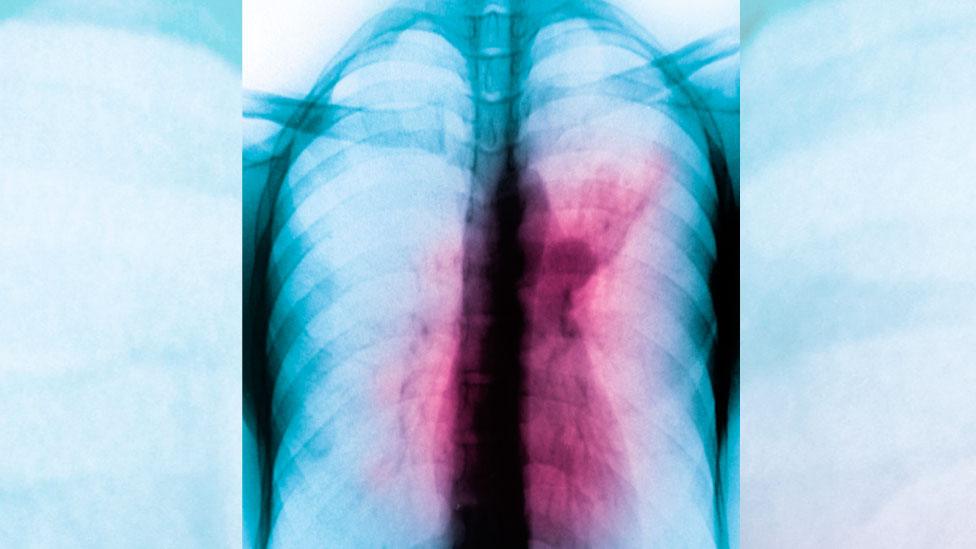Carmarthenshire TB outbreak response inadequate - report
- Published

In Wales, there are about 100 cases a year of tuberculosis
The management of a tuberculosis outbreak that lasted more than a decade was "inadequate", a report has found.
The report was commissioned due to how long the outbreak in Llwynhendy, Carmarthenshire, lasted and how many people were affected.
It gives a number of recommendations, including that any future outbreaks should be overseen by Public Health Wales from the outset.
Hywel Dda health board said it accepted the recommendations of the review.
The report, chaired by Prof Mike Morgan, ex-national clinical director for respiratory disease for NHS England, identified four phases of the outbreak between 2010 and 2022.
The outbreak started when a 71-year-old woman who worked at a pub in Llwynhendy contracted the disease.
She was first identified in 2010 but had been highly infectious for a prolonged period due to a delay in her diagnosis, according to the report, jointly commissioned by Hywel Dda health board and Public Health Wales (PHW).
During the outbreak, one woman died in 2018, but the report found it was not until 2019 that the outbreak was "formally discussed at board level" between Hywel Dda and PHW.
"I knew in my heart that she'd gone"
The initial approach was "too casual", the report says, and public health professionals did not initially think the outbreak was "likely to become as serious as it did".
The report also found failings linked to contact tracing, which focused on the family rather than other customers at the pub.
It said that "as a result, infected people were unrecognised and developed active disease, passing the infection on to others".
Staff shortages within local services was another reason why the initial response was inadequate, and there was not a lead clinician in place to oversee the response.
There was no formal or co-ordinated clinical TB service in Hywel Dda at the beginning of the outbreak, and it was not until 2014 that Dr Llywellyn Jones was appointed lead clinician overseeing the response to the outbreaks.

The outbreak stretches back to 2010 and began in a pub in Llwynhendy
Since the appointment of Dr Llewellyn Jones, the report said "there had been a significant improvement in the care of patients with TB and their contacts".
But the report's authors warn the initial outbreak "continues to cause concern now" and may become the "source of future outbreaks".
Cases linked to the outbreak continue to be identified over a decade later and it is estimated that there has been at least 31 cases of active TB and more than 300 cases of latent TB linked with the first outbreak in 2010.
Prof Philip Kloer, medical director and deputy chief executive for Hywel Dda health board, said: "We recognise the impact this outbreak has had on the Llwynhendy community and on behalf of Hywel Dda University Health Board, I offer my sympathies to all who have been affected.
"Hywel Dda University Health Board fully accepts the recommendations of the review and is committed to delivering on our action plan to develop our local TB service for both this ongoing outbreak and any future outbreaks."
PHW also accepted the recommendations of the report and admitted the initial response was "not satisfactory".
Both PHW and Hywel Dda said improvements had already been made, and a "full action plan" had been published to implement the report's recommendations.

What is tuberculosis?

Tuberculosis is a bacterial infection which is spread by inhaling tiny droplets from the coughs and sneezes of an infected person
A bacterial infection spread through inhaling tiny droplets from the coughs or sneezes of an infected person
Mainly affects the lungs, but it can affect any part of the body
Difficult to catch - you need to spend many hours in close contact with an infected person to be at risk, but is fatal if left untreated
Curable if treated with the right antibiotics
What are the symptoms?
Public Health Wales has listed the following as the main symptoms
A cough that lasts for three weeks or longer and worsens
Fever or high temperature
Considerable sweating at night
Unexplained loss of weight
Fatigue
Loss of appetite
Coughing up blood
Related topics
- Published24 February 2022

- Published30 September 2021

- Published31 May 2019
